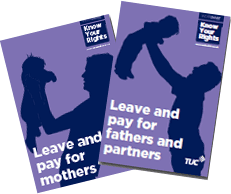Rights for expecting or new parents
Translate: 












 Rights for pregnant or breastfeeding women Rights for pregnant or breastfeeding women
All workers who are pregnant or on maternity leave have the right to not to be discriminated against because of pregnancy, for example, individuals must not be disciplined for pregnancy-related sickness absence. The hirer of an agency worker must also not end an assignment because they find out a worker is pregnant.
An organisation that has pregnant workers or new mothers working in it must take steps to minimise the risk of harm to the workers or their babies.
|
 Maternity pay Maternity pay
Some workers may qualify for 39 weeks’ Statutory Maternity Pay (SMP). The first six weeks of SMP are paid at 90 percent of your normal earnings and the rest is paid at a flat rate .
If a worker does not qualify for SMP then they may be able to claim Maternity Allowance for up to 39 weeks. Maternity Allowance is paid at the flat rate for 39 weeks.
|

Additional rights for employees who are new or expectant mothers
- There is a right to paid time off to attend ante-natal appointments.
- The employer must take steps to protect the employee and their baby from harm in the workplace. If it is not possible to adjust their job or working conditions to minimise the risk of harm, then their employer must offer them suitable alternative work on terms and conditions that are not less favourable. If it is not possible to find them suitable alternative work, the employer must suspend the employee from work and they are entitled to be paid during the suspension.
- There is a right to up to 52 weeks’ maternity leave (the first two weeks of maternity leave are compulsory). Employees must not suffer any detriment or be discriminated against for seeking to take or for taking maternity leave.
- If employees take 26 weeks or less maternity leave they have the right to return to the same job. If they take more than 26 weeks’ leave they have the right to return to the same job but if that is not possible then they have the right to return to a suitable alternative job on similar terms and conditions.
- Mothers can convert up to 50 weeks of their maternity leave into Shared Parental Leave if they and the father/her partner are eligible. Find out more about Shared Parental Leave
- If employees are adopting a child and they are expected to be the primary carer they will have similar rights to leave and pay in the first year, Here is more information on adoption pay and leave.
|
 Paternity leave rights for employees Paternity leave rights for employees
As a new or expectant father, or as the mother’s partner who is expected to be responsible for the upbringing of the child, employees have the following rights:
- They have the right to unpaid time off to attend up to two ante-natal appointments.
- They have up to two weeks’ paternity leave to be taken around the time of the birth if they have been employed by their employer for at least 26 weeks by the fifteenth week before the expected week of childbirth.
- They have up to two weeks’ statutory paternity pay if they qualify for paternity leave and they have earned more than the lower earnings limit.
- They may be able to take more leave to care for the child in the first year if they and the mother are eligible for Shared Parental Leave (SPL). This allows a mother to convert up to 50 weeks of her maternity leave into SPL which either partner can use in the first year.
- If employees are adopting a child with their partner, they will have similar rights to leave and pay. Find out more about adoption pay and leave
|
 Parental leave, flexible working and time off Parental leave, flexible working and time off
As a working parent or carer, employees have the following rights to balance paid work with family or caring responsibilities:
- Parents who are employees and have more than a year’s service with their employer have the right to take parental leave to care for a child. This leave is unpaid and can be taken in blocks of one week. Parents can take a maximum of 18 weeks’ leave for each child. A maximum of four weeks leave a year can be taken. The leave can be used up to the child’s 18th birthday.
- Employees with more than 26 weeks’ service have the right to ask their employer for flexible working.
A trade union official will be able to offer guidance on claiming these rights at work.
|
 Further information (English version only) Further information (English version only)
|